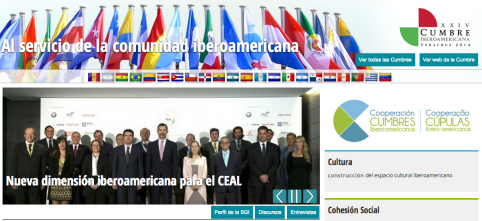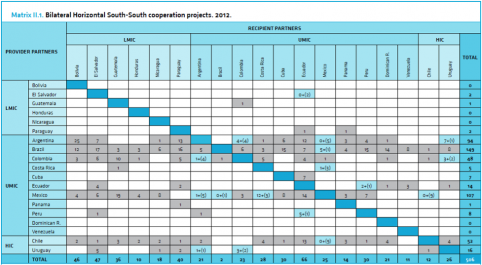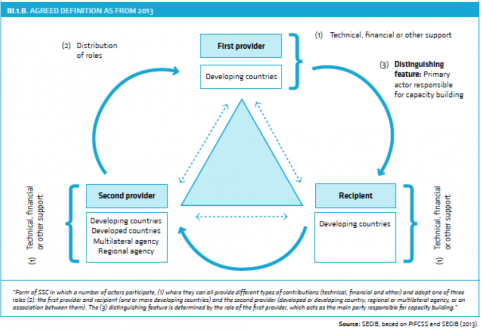
In the mid-2000s, Latin American countries faced a worrying trend: official development assistance (ODA) from ‘traditional’ donors was decreasing in the region. As a result of the global financial crisis and focus on the least developed and low income countries, Latin American countries were receiving a relatively small amount of aid from the predominantly Western donors comprising the Organization for Economic Cooperation and Development’s (OECD) Development Assistance Committee (DAC).
Latin American countries have been able to withstand this trend because of increasingly effective, versatile development cooperation between countries in the region. Created to support the goals of the Ibero-American Summit in 2003, including south-south cooperation (SSC), the Ibero American General Secretariat (SEGIB) was a milestone for Latin American development cooperation. In 2008, SEGIB created the Ibero-American Program to Strengthen South-South Cooperation (PIFCSS). To further promote and inform SSC practices in the region, SEGIB also launched an annual report on Ibero-American cooperation. Over time, SEGIB used this report to develop a methodology for capturing development cooperation amongst Latin American countries. While the OECD had an existing methodology for tracking ODA, the 19 Latin American countries in SEGIB (none of which actually report aid to the OECD) felt that this methodology would not effectively capture their development cooperation practices. Instead, SEGIB’s continually evolving methodology was uniquely designed to fit the principles and practices of Latin American cooperation.
The result of these efforts - a robust methodology for capturing South-South development cooperation – is an important achievement. The methodology highlights some of the key reasons why Latin American countries are not comfortable reporting their cooperation activities according to the OECD’s methodology for ODA, and identify the value of an alternative framework for defining and tracking development assistance.
Horizontal and Triangular Cooperation

Source: SEGIB, Report on South-South Cooperation in Ibero-America, 2013-2014
Like other South-South Cooperation providers, SEGIB emphasizes the horizontal nature of development cooperation and their reporting methodology highlights the bidirectional nature of development financial flows. A key component of their reports is a matrix, included above, in which countries are simultaneously listed as recipients and providers. Each Latin American country listed in the matrix was a recipient of development cooperation funding in 2012, and several were also providers (including a number of Lower Middle Income Countries). This pattern stands in stark contrast to ODA, which assumes uni-directionality of aid, typically from the global North to the global South.
Beyond horizontal cooperation, the SEGIB methodology is designed to accommodate other arrangements that characterize the diverse nature of development cooperation, such as the triangular cooperation shown below. In triangular cooperation, a set of actors, including developing countries, jointly provide different types of assistance to another recipient country.

Source: SEGIB, Report on South-South Cooperation in Ibero-America, 2013-2014
Technical Cooperation and Monetization
As with many manifestations of South-South Cooperation, the exchange of experiences, expertise, and knowledge is the central component of development cooperation between SEGIB countries. It is often difficult to assign monetary value to these practices (as discussed previously), which is problematic for comparison since the OECD focuses primarily on the value of projects and other assistance. SEGIB sought to create a more accurate picture of their development cooperation through using the number and type of activities (e.g., knowledge sharing, institutional strengthening) to further describe the scope of cooperation.
SEGIB is continually refining their methodology - their 2013-2014 report, released this past spring, is a great example of their increasingly sophisticated statistical analysis. Building capacity of member countries to report their cooperation activities is another important SEGIB focus area, as current efforts are underway to construct a centralized, web-based platform to track all cooperation within the SEGIB network. One way AidData has engaged with SEGIB countries has been through a partnership with ObservaCoop at Instituto Mora in Mexico, as one of their primary areas of study is South-South Cooperation. AidData has helped to advance their organizational objectives by building software tools and implementing capacity building/training exercises and we benefit from the detailed regional knowledge the institute can provide. Moving forward, AidData is working to establish similar partnerships with other SEGIB countries.
The SEGIB methodology presents an interesting alternative to the ODA standard and suggests a new approach to systematically tracking development assistance. While primarily relevant for the SEGIB context, this framework offers a valuable contribution to discussions on a broader, more inclusive definition of development cooperation.
